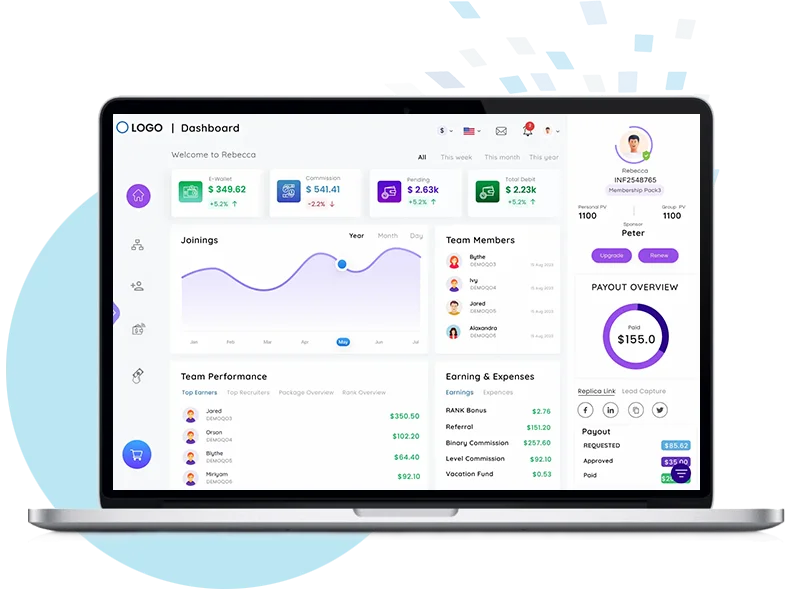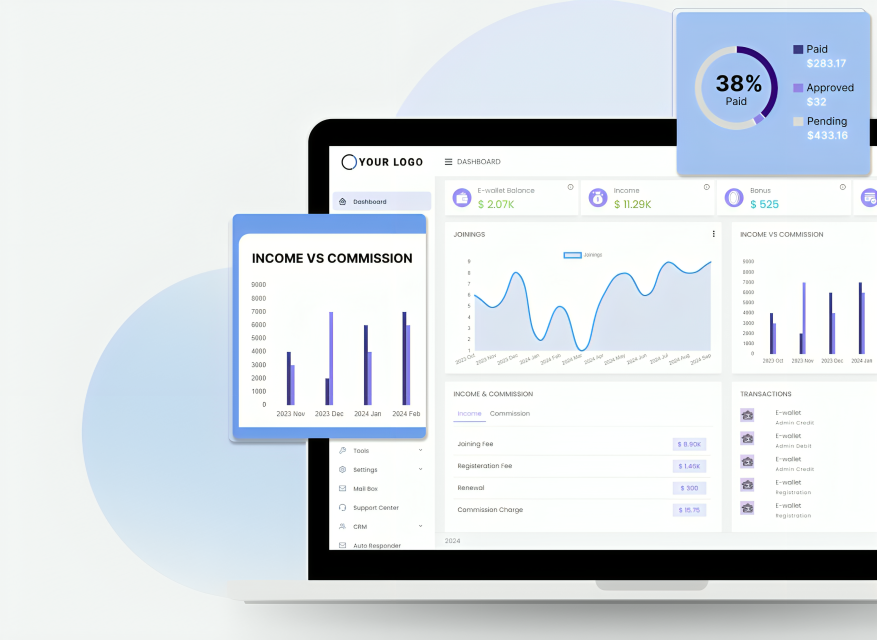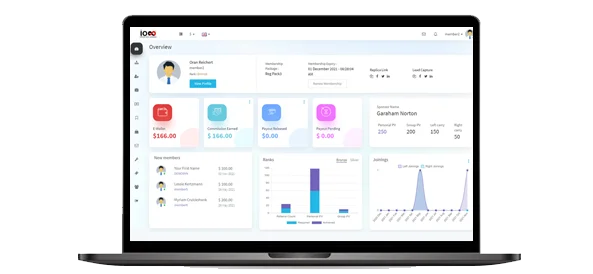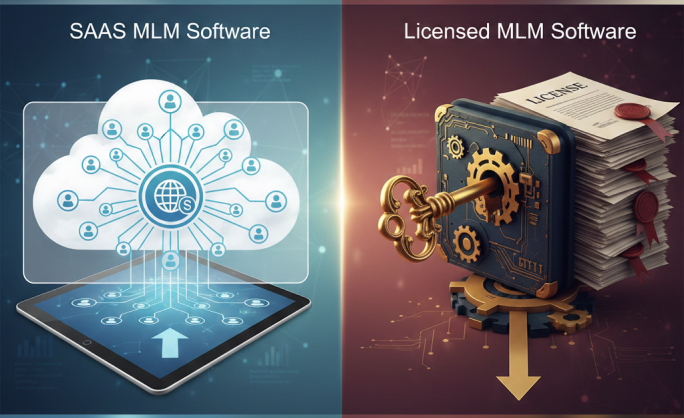The global real estate market is projected to reach an impressive value of $654.40 trillion by 2025. Moving forward, the sector is expected to expand at a compound annual growth rate (CAGR) of 2.69% from 2025 to 2029, with the market volume anticipated to hit $727.80 trillion by 2029. With such huge numbers, it’s no surprise that real estate MLM is emerging as a prominent sector within the network marketing industry.
Real Estate MLM is a business model where agents not only earn commissions from property sales but also from recruiting new agents into the network. The rise of real estate MLM in the property business has mostly been because of its ability to combine the benefits of traditional real estate brokerage with the power of network marketing, allowing agents to earn both direct commissions and passive income through their downlines.
In this blog, we will have a detailed look into real estate MLM, how it works, how MLM software simplifies this process, the common challenges in this business and strategies to overcome them.
What is Real Estate MLM?
Real Estate MLM refers to a business model in the real estate sector where agents not only earn commissions from selling properties but also recruit other agents to build a downline. The recruitment of new agents helps generate additional income through commissions from their sales.
Unlike traditional real estate brokerage models where agents earn commissions solely based on their own sales, in real estate MLM, agents can earn income from their downline agents’ sales, creating multiple streams of income.
This structure applies the principles of network marketing to property sales, allowing agents to utilize the work of others to increase their earnings. The basic structure includes direct property sales (Level 1), downline commissions (Level 2) and residual income through network growth (Level 3).
Grow Your Real Estate MLM with Confidence
Our software makes managing commissions, leads, and teams simple, so you can focus on building your real estate network.
Check Out the FeaturesReal Estate MLM vs Traditional Real Estate Careers
A key difference between real estate MLM and traditional real estate careers lies in the structure of income. While traditional real estate agents earn commissions based solely on their own sales, real estate MLM agents can earn through their direct sales and the sales made by their downline.
Traditional real estate agents work on a commission-only basis, while salaried realtors receive a regular income but may have lower earning potential compared to commission-based agents.
There is potential for passive income in real estate MLM along with scalability but can be challenging due to the high pressure of recruitment and market competition. Traditional real estate careers offer a more direct path to success but may lack the passive income opportunities that MLMs provide.
How Real Estate MLM Works
The commission structure in real estate MLM is typically divided into different levels to reward agents for their sales and recruitment efforts:

Level 1 (Direct Agent Commission)
Agents earn a commission for properties they sell directly. This is usually in the range of 7-10% of the sale price.

Level 2 (Downline Commission)
For every agent recruited into the business (downline), the original agent earns a smaller percentage of the commission from sales made by the downline agents, typically 3-5%.

Level 3 (Residual Commission)
This is a passive income stream, where agents earn a residual commission for the work done by agents recruited further down the line. This is usually around 1-2%.
As the downline grows, earnings compound, leading to a potential passive income stream. For example, if an agent sells a $400k property, their direct commission might be around $28,000 (7% commission).
If that agent has recruited other agents who sell properties, they can earn a portion of their commissions, creating ongoing passive income even when not directly involved in the sale.
Types of Real Estate MLM Programs
Real Estate MLM programs come in different forms, customized to various business models:

Brokerage-based MLMs
These programs focus on agents selling properties and recruiting new agents. The agents in the downline are incentivized to sell properties and build their own teams.

REIT (Real Estate Investment Trust) MLMs
This model focuses on property investment rather than sales. Agents may earn commissions through property investments and the growth of their investment networks.

Education-based Real Estate MLMs
In this model, agents sell training courses and materials related to real estate investing, sales strategies or property management. They can also recruit others to sell educational products.

Referral-based MLMs
Agents earn commissions by referring clients to brokers or real estate companies. Unlike other models, the focus here is on building a network of referrals rather than direct property sales.
Choosing the Right Real Estate MLM Program
Before joining a real estate MLM program, it’s important to evaluate several factors:

Training & Support
Effective training and ongoing support are essential for success in any MLM business. Look for programs that provide structured onboarding, ongoing mentorship or coaching and access to resources such as marketing materials, client acquisition techniques and real estate tools.

Legal Compliance & Reputation
Before signing up, you must ensure that the real estate MLM program is legally compliant with local regulations. Make sure that your program is registered and regulated by relevant real estate authorities in your region, has a transparent business structure and maintains a good reputation in the real estate industry and MLM community.

Compensation Plans & Commission Rates
Different programs offer varying levels of commission structures, so it’s important to fully understand the earning potential before you get involved. Pay attention to commission breakdowns, residual and passive income opportunities in real estate, incentives and bonuses and payment frequency.

Hidden Costs & Fees
It’s essential to review the fee structure carefully and be aware of any upfront costs such as membership fees, training fees, monthly or annual fees etc. Look for programs that offer clear transparency regarding all fees upfront so you aren’t caught off guard by unexpected costs down the line.

Avoiding MLM Scams
Unfortunately, there are MLM programs in real estate that operate as scams or pyramid schemes, where the focus is more on recruitment than actual property sales. To avoid falling into such traps, be vigilant and look for red flags such as programs that emphasize recruitment over actual sales.
The Role of MLM Software in Real Estate

In real estate MLM, software solutions play a crucial role in managing the complexities of commission tracking, lead generation, training and overall business operations. Key features of MLM software in real estate include:

Commission Management
MLM software ensures precise tracking of commissions across multiple levels of agents. This feature automates the process of calculating commissions for both direct sales and downline sales, ensuring accurate and timely payouts for agents, reducing manual errors and maintaining transparency.

Lead Generation & CRM Integration
Effective lead generation is vital in real estate, and MLM software often integrates with CRM systems. This allows agents to efficiently manage and nurture their client and downline databases, track potential leads and promote communication. This integration helps increase conversion rates and maintain strong relationships with both clients and recruits.

Agent Training Portals
Successful real estate MLMs offer continuous learning opportunities to their agents. MLM software often includes training portals where agents can access resources such as tutorials, webinars and training materials. These portals are essential for keeping agents informed, improving their skills and ensuring that they understand both real estate processes and the MLM business model.

Mobile-Friendly Dashboards
Many MLM software solutions offer mobile-friendly dashboards, enabling agents to manage their businesses from anywhere. These dashboards provide real-time insights into sales performance, downline growth, commission tracking and more. Being able to access these features on mobile devices ensures that agents can stay connected and make informed decisions even when they’re on the go.
The History & Growth of Real Estate MLM
The roots of real estate MLM can be traced back to early referral programs in real estate, where agents would earn bonuses for referring clients to brokers or fellow agents. Over time, this concept evolved into a more structured MLM model, allowing agents to recruit others, build networks and earn commissions from their downlines.
A notable example of this shift is the rise of companies like eXp Realty MLM, which adopted an MLM structure in the real estate industry. Since then, real estate MLM has seen significant growth, fueled by advancements in digital marketing and more flexible work arrangements, allowing agents to work remotely and recruit globally.
Current market trends show a growing shift towards virtual and cloud-based real estate firms that offer agents opportunities to earn not just from direct sales, but also from building and nurturing large teams, making real estate MLM increasingly popular.
Common Challenges in Real Estate MLM & How to Overcome Them
Here are some of the most common obstacles faced in the industry, along with strategies to overcome them:
Recruitment Struggles
Many agents struggle because recruiting new members into the business requires more than just a simple pitch. It takes persistence, effective communication and relationship-building.
How to Overcome It:
-
Build Strong Relationships:
Rather than just focusing on making a sale, take the time to develop relationships with potential recruits.
-
Utilize Marketing Tools
Use social media marketing, content marketing and email campaigns to reach a wider audience and automate some of the recruiting processes.
-
Offer Incentives
Use bonuses or rewards to encourage existing agents to recruit others. This creates an additional layer of motivation and a sense of teamwork.
Competitive Market
The real estate industry is highly competitive, with numerous agents vying for clients, deals and market share. This can make it difficult for agents to stand out, especially when competing against traditional real estate agents who may not be involved in an MLM structure.
How to Overcome It:
-
Offer Exceptional Customer Service
Be responsive, reliable and helpful to your clients, making their experience as smooth and positive as possible.
-
Develop a Personal Brand
Focus on what makes you unique whether it’s your deep knowledge of a particular market or your expertise in a niche area.
-
Use Technology
Use tools like CRM systems, digital marketing strategies etc to get an edge over competitors.
High Turnover Rates
A common issue in real estate MLM is high turnover, with many agents leaving within the first year. This can be attributed to several factors, including unrealistic expectations, lack of training and insufficient support.
How to Overcome It:
-
Ongoing Training & Development
Provide onboarding and continuous training. Equip agents with the skills they need to succeed in both sales and recruitment.
-
Mentorship Programs
Pair new agents with experienced mentors who can offer guidance, motivation, and support.
-
Foster a Supportive Environment
Create a community of agents where support and collaboration are encouraged.
Balancing Recruitment & Property Sales
While recruitment is key to growing a successful downline and generating passive income, agents must still focus on selling properties to maintain a steady income. Balancing these two tasks can be overwhelming, especially for new agents who are still learning the ropes.
How to Overcome It:
-
Automate What You Can
Utilize technology to automate certain aspects of the process. For example, use automated email campaigns to nurture leads or CRM systems to track prospects and downline progress.
-
Create Clear Goals
Help agents set daily, weekly, and monthly goals that incorporate both recruitment and sales targets. Having clear and attainable objectives helps agents stay motivated and balanced in their approach.
-
Provide Support for Both Aspects
Ensure that agents receive training and support for both selling and recruiting. Ideally, your program should offer resources that help agents develop strategies to manage both parts of the business successfully.
Conclusion
In conclusion, real estate MLM presents a unique and promising opportunity for agents looking to earn both through direct property sales and by building a network of recruits. The structure of MLM allows for passive income potential, where agents can benefit from the success of their downlines, creating a more scalable business model.
However, it is crucial to choose a legitimate and well-structured program that offers solid training, compliance with regulations and a fair compensation plan. With the right guidance and support, real estate MLM can be a pathway to financial freedom and long-term growth in the property industry.
Frequently Asked Questions
Real Estate MLM is legal when it focuses on actual property sales and recruitment, with commissions earned from both direct sales and the efforts of recruited agents unlike pyramid schemes, where income is primarily generated from recruitment without any real sales.
Yes, it is possible to make a full-time income from real estate MLM, but success largely depends on your ability to recruit new agents and consistently close property sales.
Some of the top real estate MLM companies include eXp Realty, Realty ONE Group and Keller Williams Realty.
Yes, in most cases, you do need a real estate license to sell properties and earn commissions in a real estate MLM program.
In real estate MLM, compensation is typically earned through direct commissions on property sales and indirect commissions from the sales and recruitment efforts of agents within your downline.
The costs to join a real estate MLM can vary widely depending on the company. Common expenses include training fees, real estate licensing costs, monthly or annual membership fees, marketing tools and technology subscriptions.











